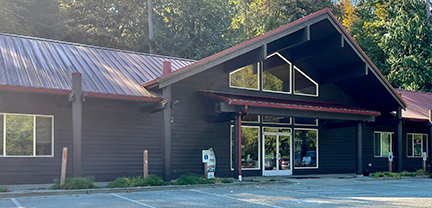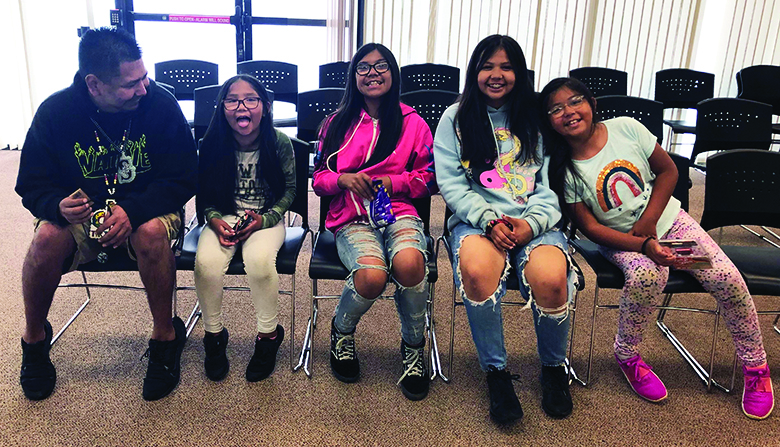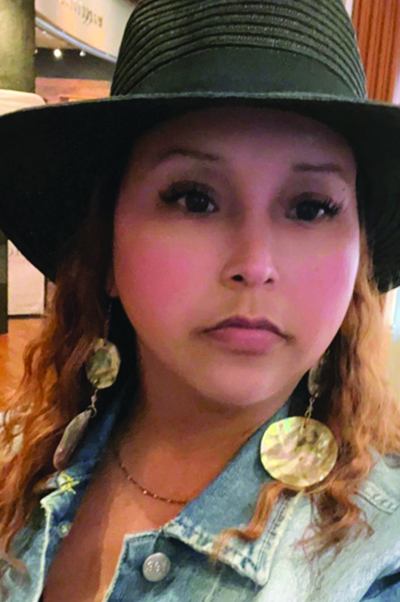
By Shaelyn Smead; photos courtesy of Delia Williams and Theodore Sam
Helping beda?chelh is essential for at-risk tribal youth
The beda?chelh department is in desperate need for respite care workers (daycare) and placement homes (fostering). Unfortunately, with very few tribal volunteers, many of the cases are forced to lean on state-sourced foster resources and non-tribal homes. Leaving a lot of questions and concerns about where these children will end up, and how they will remain connected to the tribe and their culture.
The process for beda?chelh to locate a respite care provider or placement home can be quite grueling. They create a list of family members related to the child and anyone who is 18 years old or over will be contacted and asked if they would be willing to step up and take in their family member.
Tribal member and beda?chelh Placement Specialist Delia Williams who is on the frontlines and helps make these phone calls, said, “Our whole goal is to try and keep our kids here with us. We want to keep families together, but it’s sad because 97% to 98% of the time, these family members will say no. They either aren’t willing or aren’t able to take their family in.” At which point, beda?chelh continues down the list to see if there are any other tribal homes that would be willing to help. After finishing these efforts, and they aren’t able to place into a tribal home, that is where beda?chelh is cornered and forced to utilize State-sourced foster homes.
The reality of having laws like the Indian Child Welfare Act of 1978 and the 1989 Centennial Accord, can be a double-edged sword. The laws have allowed for tribes to maintain jurisdiction over at-risk tribal youth and their wellbeing. Creating a separation between state programs like Child Protective Service and the beda?chelh department. However, it is also up to its tribal members to support the system that is in place and provide services that would otherwise be available through the state. In other words, if there are no tribal respite care workers or tribal placement homes available, then the department is forced to outsource to State and non-tribal workers and homes. At which point, a tribal child could end up living anywhere within the state of Washington, and could be hundreds of miles away from their people.
Why are tribal members skeptical of beda?chelh?
To some, it might seem like simple math. If tribal members want to keep their youth close to their community, they must be willing to open their homes and support their lost cousins, nieces, nephews, etc. So why is beda?chelh struggling to find tribal volunteers?
For some tribal members, it’s the concern that they would be opening up their home to futures investigations and the threat they might have their own kids taken. For others, it’s the risk of behavioral issues that at-risk youth could bring into their home could have an effect on their other kids. Some families feel as though they might not be able to financially afford the costs that come with taking in another child. And for some, it’s simply living in a small community and knowing the backlash they might be facing from their peers.
How is beda?chelh tackling these concerns?
Delia talked about how the department handles some of these concerns. “In any case where a volunteer has a child in their home and in their care, we do a background check, and run a home study to make sure the home is safe, clean, and able to take care of a child. In other cases, where the volunteer just babysits in the family’s home, it doesn’t require a home study. Still, the background checks only go back as far as six years, this allows for tribal members that only have mild records, the opportunity to still volunteer and help,” she said.
When discussing the extrinsic nature of the volunteer respite care or placement position, Delia illustrated that visits from the beda?chelh social worker are only about once a month, just to ensure the well-being of the tribal child. Other than that, the social worker is also helping remind the volunteer of upcoming cultural events that the tribal child can attend, to observe cultural practices, providing sport and extracurricular opportunities, and resources that the child may want/need. These visits are also an opportunity to check on the mental and emotional state of the volunteers in making sure that they are doing okay with their transition. The social worker will then provide the volunteers with any assistance they may be needing as well. If there is a point in which the volunteer feels overwhelmed, they also reserve the right to forfeit their services.
Some families fear that by opening up their home, they risk beda?chelh potentially taking their own kids away from them. Delia spoke that a situation like this would only occur in severe cases that required it. Even then, in her experience she has not witnessed this happen.
Delia said, “If we notice a respite care worker, or placement home provider struggling in any way, we want to help. We know the sacrifices that these people are making, and we want to help our tribal youth as much as possible. Whether we’re helping guide them to programs, or grants, our goal is to help these providers, not hurt them. By helping them, we are helping our tribal kids.”
There is compensation available for respite care workers and/or placement homes. Once a home study and background check has been conducted, and care services have been designated, then compensation will become obtainable. Respite care and family grant amounts vary applicant to applicant.
Money aside, there is still the fear of backlash that a respite care worker or placement home fears. Beda?chelh does ensure confidentiality with every case, however with the coming of social media and living in such a small community, sometimes being anonymous on paper, doesn’t help the reality of the world. Word travels fast and sometimes your services become public knowledge.
One thing that Delia said in regards to this was, “Ultimately these families that are helping only have to tell people what they feel comfortable with. There’s not much we can control when word starts spreading, but I encourage our volunteers to feel comfortable enough to just own it. They’re doing something great for our community and not a lot of people would be willing to do what they’re doing. Every time someone steps up to help a tribal child, it sows that seed that our community is willing to help each other.”
This same backlash is unfortunately what employees within the department face, and Delia deems the reason as to why is there aren’t as many tribal employees working for the department as there should be. “Our people are just as scared and intimidated sometimes by the retaliation we face,” she said. “But we know what is going on with these cases, and we support the decisions that our tribal and non-tribal coworkers make.”
Families that have gone through beda?chelh intake
Unfortunately the beda?chelh department also simply doesn’t have a great relationship with many tribal members and there is a level of distrust. Those families sometimes even speak very publicly about their difficult experience, which in turn carries out a negative perception of the department.
One person who has posted on social media frequently about their experience and has shared her story is Skyla Henry. In 2015, Skyla and her husband struggled with addiction and separated from one another. Skyla’s mother realized all that was going on and took in their kids and raised them for some time. Skyla’s addiction grew deeper and resulted in her being put into prison. During which, life became too difficult for Skyla’s mother, and the kids ended up in beda?chelh’s care, and placed into a home. Years went by as the parents struggled with their sobriety, and the case subsequently closed. Skyla’s husband is now two years sober, and Skyla is four months sober. Now with the two being back together, sober, in a home and working, the couple is anxious and wondering what possibilities there are to be back in their children’s lives. With the case being closed three years ago, it leaves a lot of questions for them.
“I’m really upset because I want some answers,” said Skyla. “I know I haven’t been in my kids’ lives for a long time, and I appreciate all that the placement family has done for them, but you can’t fight the bond between parents and their kids. I just want to know what options I have and what possibility there is for us to be in their lives, even if it’s just visitation. It’s the emptiest feeling in the world being so close to my kids, knowing I could run into them anywhere but not being able to see or talk to them.”

Another tribal family shared a similar story. Theodore Sam struggled with addiction. His four kids were not living in a stable home, and were missing frequent amounts of school. When Theodore first encountered beda?chelh, they were at the beginning of their investigation. “They were coming by and offering different treatment plans and services and were trying to help us. Beda?chelh wanted us to get better, but I didn’t want to receive help,” Theodore said.
Unfortunately, after spending time with the children’s mother, and the parents still struggling with their addiction, the case was taken to Tribal Court and the children were placed into placement homes. At this point, Family Wellness Court provided resources that Family Services has and a case manager stepped in with IOP support, helping Theodore find a home, and create goals and a game plan to get his kids back. Theodore was able to keep contact with his children during that time, but he knew that he needed to do more.
After some time, hard work and dedication, Theodore was doing three Urine Analysis (UA) tests a week, found a job, and a shelter to live in. In March 2022, Theodore earned custody of all four kids. “Beda?chelh has been really helpful, and my case manager even has helped me with picking up my kids, or taking to them to appointments or the doctors. I know beda?chelh receives a lot of hate, but parents need to be able to do the work. It takes time, and you have to do the right things to get your kids back,” Theodore explained.
Delia, who not only is a tribal member and works for beda?chelh, also was once a child in the system. She ended up living most of her life with some of her family in Spokane, away from the reservation. And even though she remained in a tribal home, she was able to witness and give a unique perspective to both sides of the system. She spoke about her experiences with the community turning a blind eye to the levels of addiction, physical and sexual abuse that are prevalent in the community and how it affects tribal families.
“I think it stems from generational trauma and the effects of our elders’ experience in residential boarding schools,” she said. “We hear the stories of the physical, mental, spiritual and sexual abuse that our ancestors and elders went through. The trauma that they endured made it so they couldn’t speak on it, and it has caused and taught our people to be quiet and not speak about what happens behind closed doors. But we have to change that.”
Now is the time to get involved
Currently the ICWA is at risk within the US Supreme Court, and is set to be reviewed in the fall. If the ICWA is overturned, that means many tribes across the nation will struggle to maintain oversight of their at-risk tribal youth. The state in which they live will then oversee the investigation and put tribal children into their state foster care system, and the child risks no longer having ties with their people. Luckily for tribes within the state of Washington, the Washington Supreme Court came to a unanimous decision in 2020 that require the courts to use active efforts to recognize when a child is belonging to a tribe and prevent the breakup of an Indian family. Since then, an official ‘opinion’ in July 2022 was presented by the Washington Supreme Court supporting those same 2020 decisions and the works of the Washington Indian Child Welfare Act (WICWA). Making issues of tribal welfare organizations less at risk in the state of Washington. However, it doesn’t take away the need for respite care workers and placement homes with Tulalip Tribes. Tulalip youth need their community to lean on.
“We need Tulalip’s influencers and leadership to step up and speak out about these issues that we’re facing. It needs to be talked about”, Delia said.
If you or anyone you know is interesting in helping with respite care or are willing to provide placement home services, please contact beda?chelh at 360-716-3284.
